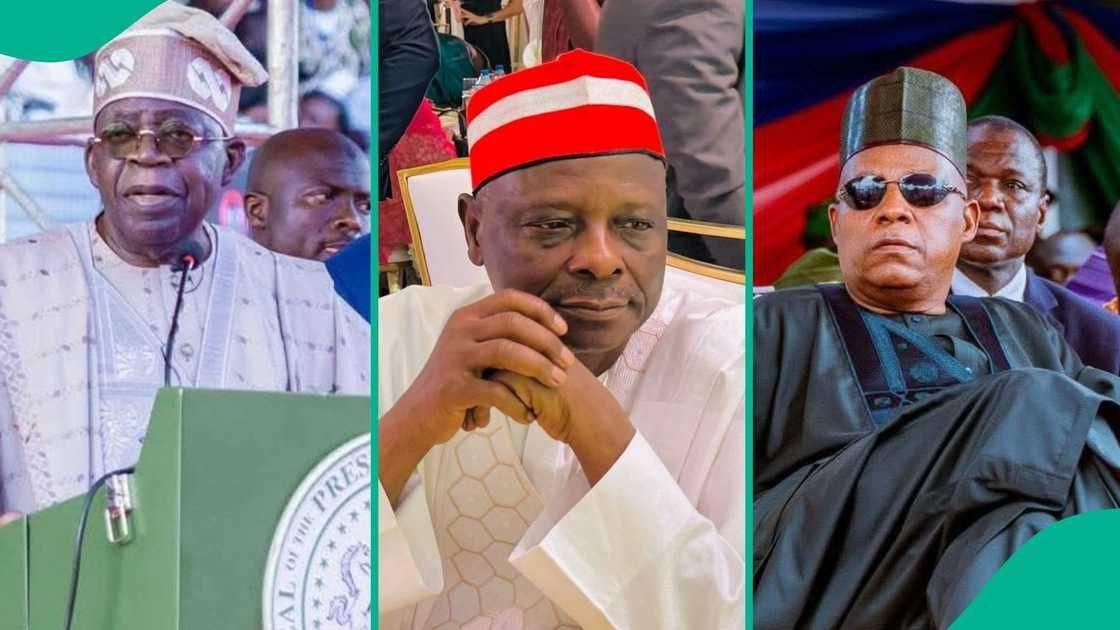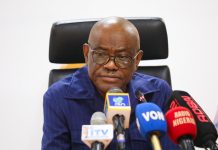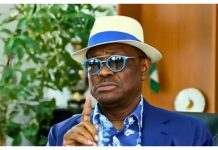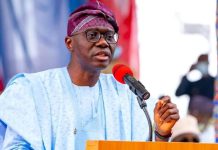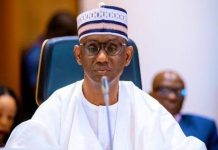Abba Hamisu Sani
Africa-Press – Nigeria. As 2027 approaches, political alignments and realignments are expected—especially with opposition members forming a strong platform under the African Democratic Congress (ADC) with the aim of unseating President Bola Ahmed Tinubu in the next election.
In the same vein, Tinubu and the ruling APC are wooing opposition PDP governors, particularly from the South-South, a region that has been under PDP control since the return of democratic rule in 1999.
The governors of Akwa Ibom and Delta States have recently joined the APC, and there are indications that the suspended Rivers State Governor, Fubara, is eyeing the ruling APC.
Political observers describe this development as a power struggle—oppositions attempting to wrest control from the incumbent APC, while the APC is determined to retain power by any possible means ahead of the 2027 election.
Kwankwaso’s Possibility of Returning to the APC
Senator Rabi’u Musa Kwankwaso, the New Nigeria People’s Party (NNPP) presidential candidate during the 2023 election, is seen by many political commentators as a formidable politician who could boost Tinubu’s chances of winning the 2027 election. As a former governor of Kano State, he still retains significant political influence there.
Kwankwaso placed fourth in the 2023 presidential election, and his party won the Kano State gubernatorial election with the highest number of votes.
Many observers attribute the recent and unexpected resignation of APC National Chairman Dr. Abdullahi Umar Ganduje—who is also from Kano State and a former governor—as one of Tinubu’s strategic moves to pave the way for Kwankwaso’s return to the APC.
It is common knowledge that the two Kano politicians, Kwankwaso and Ganduje, are arch political rivals, despite having spent decades as allies.
Kwankwaso’s Next Move Could Redefine APC, Rewire the Path to Nigerian Presidency
Kalu Okoronko, a leadership and good governance advocate, said that by any political barometer, the former Governor of Kano State and former Minister of Defence, Senator Rabi’u Kwankwaso, is not your everyday Nigerian politician. He is a phenomenon—an institution built on charisma, grassroots connection, and stubborn ideological defiance.
For years, his political trajectory has been one of rebellion, reform, and resilience. He defied the odds to become Governor of Kano State twice, navigated Nigeria’s tumultuous political waters as a senator, and in the 2023 general elections, led the New Nigeria People’s Party to a surprise “third force.”
Yet today, conversations are shifting: what if Kwankwaso makes the most dramatic move of his career by rejoining the All Progressives Congress?
The conversation has grown even more intense following the sudden resignation of APC National Chairman Abdullahi Umar Ganduje. While the public narrative suggests “internal restructuring,” insiders and analysts see the move as a calculated sacrifice—a strategic detour to clear the path for Ganduje’s longtime rival and one of the most influential politicians in northern Nigeria to rejoin the party.
Ganduje’s Resignation and Leveraging the Popularity of Kwankwaso
Ganduje’s resignation is more than just the fall of a party chieftain; it is political brinkmanship aimed at leveraging Kwankwaso’s popularity in Kano State for a major political gain in the 2027 elections.
The Tinubu administration, increasingly criticized by northern elites for executing a “Yoruba agenda” and abandoning the region that largely brought it to power, now finds itself in urgent need of a northern political redeemer—someone with street credibility, a cult-like grassroots following, and the electoral weight to bridge the growing trust deficit.
Kwankwaso Fits the Bill
For the APC, Kwankwaso fits the bill. His Kwankwasiyya Movement is a formidable political platform in Kano State and beyond. For Kwankwaso, this invitation to power could be the launch pad for the presidency he has long dreamt of.
If he chooses to align with the APC, it will be a gamble—but one with high stakes and possibly higher returns. For the party, it would signal a rebirth. For Kwankwaso, it might just be the final chapter in a storied career—the path to Aso Rock that no structure alone could pave, but only influence could unlock.
In a recently circulated and strongly worded statement personally signed by him last month, Kwankwaso emphasized that the APC had inflicted untold hardship, economic deterioration, and deepened insecurity on Nigerians since assuming power.
He condemned the party’s track record of what he described as reckless governance, policy failures, and a disconnect from the everyday realities of the Nigerian people.
The former Kano State governor said that although the President had personally reached out to him to consider rejoining the party—despite the flattering promises—he made it crystal clear that he would rather quit politics entirely than return to the APC, a party that had inflicted immense hardship on Nigerians.
“I wish to state clearly and unequivocally that President Tinubu personally reached out to me on multiple occasions, urging me to return to the APC fold. He called me directly and made several overtures, both in private and through mutual contacts, in a bid to lure me back to a party that I once helped build but ultimately had to leave due to its departure from principle and justice,” Kwankwaso said.
The former Kano State governor added that during one of his conversations with Tinubu, he was assured that the party would meet all the conditions he gave before he could rejoin the fold.
At face value, this idea borders on irony. For long, Kwankwaso has dismissed the APC as an unfit house of contradictions—a political contraption built on shifting sands. But the big question that stares Nigerians in the face is: could Kwankwaso’s long-standing rivalry with Abdullahi Ganduje, former Kano governor and immediate past APC national chairman, be the reason he never wanted to do anything with the APC?
Is Ganduje being sacrificed to accommodate Kwankwaso in the APC?
Politics, like war, obeys the law of strategic necessity. And 2027 is not just another election year—it is a turning point in Nigeria’s democratic journey. The ruling APC, battered by public discontent, internal cracks, and a leadership struggling with economic hardship and insecurity, faces the monumental task of renewal or rejection. In that context, Rabi’u Kwankwaso would not just be another defector, but a potential political dividend too significant to ignore.
The most potent threat to Tinubu’s 2027 ambition is not merely the anger of the masses; it is the quiet convergence of powerful political rivals, former allies, and embittered party insiders who are now aligning—not out of love for one another, but out of a shared goal to stop Tinubu from securing a second term.
From PDP governors who feel sidelined in national politics to anti-Tinubu Northern elites led by El-Rufai, the groundswell of opposition to Tinubu’s re-election is growing by the day.
This has prompted Tinubu to turn to what he knows best: the politics of bargaining, coalition-building, and recruiting influence as a substitute for popularity.
With 2027 drawing closer, Kwankwaso now finds himself at the center of Nigeria’s political chessboard.
The APC is rumored to be considering offering him the vice-presidential ticket—a power-sharing arrangement meant to seduce his northern base and tap into his electoral machinery.
On paper, the deal seems attractive: national visibility, institutional resources, and a credible path to the presidency by 2031.
Fear of Use and Dump
Edwin Philip, a public affairs analyst, discussed the possibility of Kwankwaso’s return to the APC and the suggestion that he might replace Kashim Shettima as Vice President.
“Ideology is no longer part of Nigerian politics, but self-interest,” Edwin said.
The public affairs analyst added that, politically, Senator Kwankwaso is stronger than Shettima, as he has control over Kano and some other northern states’ politics. If Tinubu picks Kwankwaso as his running mate, it would be easier for him to face the new coalition under the African Democratic Congress, which includes former Vice President and PDP presidential candidate during the 2023 election, Atiku Abubakar, Peter Obi, El-Rufai, and David Mark as the drivers of the movement.
But beneath the surface lies a more sobering possibility: that Kwankwaso could simply be a means to an end—a disposable political tool to retain northern votes for a southern presidential candidate, only to be discarded post-election. It is a tactic as old as Nigerian politics itself: bait the North, win the votes, and then shift the power dynamics.
This is not the first time northern political figures have been wooed into national alliances with promises of future power. Think of Atiku Abubakar under Olusegun Obasanjo, or Namadi Sambo under Goodluck Jonathan—both powerful in their zones, yet relatively politically neutered in the larger governance arrangement. The question before Kwankwaso is simple: Will history repeat itself—or will he rewrite it?
Unlike some of his predecessors, Kwankwaso commands an ideological movement, not just political followers. The Kwankwasiyya Movement has shown remarkable staying power and electoral resilience, especially in Kano and some northern states. This gives him leverage—but only if he negotiates from strength, not desperation.
For More News And Analysis About Nigeria Follow Africa-Press


